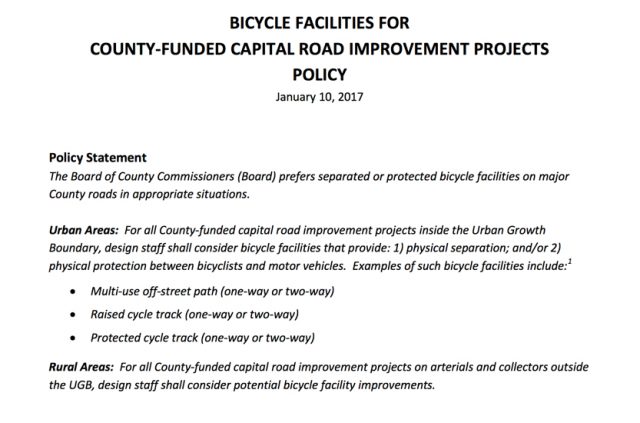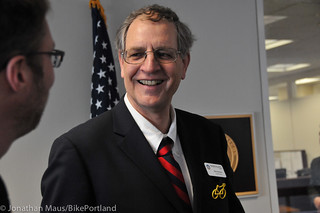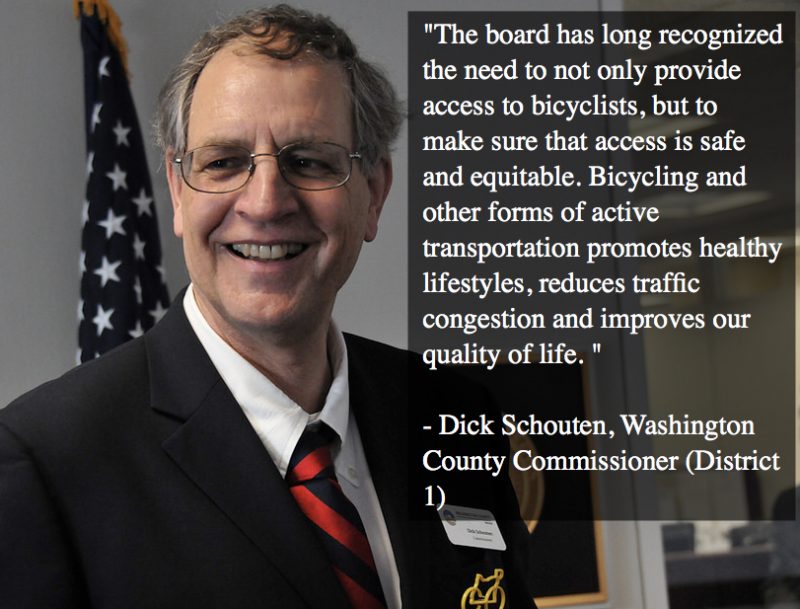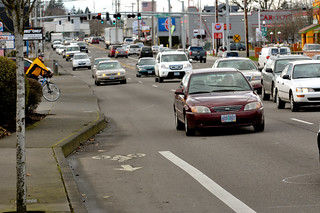Roads in Washington County are notorious for being wide and fast — which is why a new policy to physically separate motor vehicle users from bicycle users is such good news.
Last week the Washington County Board of Commissioners voted unanimously to codify their preference for protected bicycle facilities on major County roads.
In a statement about the policy, District 1 Commissioner (and Vice-Chair) Dick Schouten* said, “The board has long recognized the need to not only provide access to bicyclists, but to make sure that access is safe and equitable. Bicycling and other forms of active transportation promotes healthy lifestyles, reduces traffic congestion and improves our quality of life. As a Board, we are committed to doing everything we can to support this by making sure our roadways are safe for all modes of transportation.”
The policy (begins on page 45 of this PDF) that passed at the January 10th meeting not only states the Board’s preference, it also requires County staff to evaluate the feasibility of separated bicycle facilities on all County-funded capital road projects and then present those options to the Board before projects move beyond the 30 percent design stage. Also, when designing new road projects, County staff will be required to evaluate at least two bicycle facility types — including at least one that provides physical separation and/or protection of bicycle users from motor vehicle users.
Here’s an overview of the new policy:

Advertisement

According to the County, the new policy reflects their, “commitment to the benefits of active transportation.” A statement specifically mentioned using the new policy for projects that improve biking and walking access to schools. The County has committed $2 million per year for the next ten years to projects identified in their School Access Improvement Study.

Specific facility-types mentioned in the adopted policy include: multi-use, off-street paths; raised cycle tracks, and protected cycle tracks. It would also apply to both urban and rural projects — that’s an important piece of the story because Washington County is about evenly split between urban and rural roads and is home to some of the most popular recreational riding in the region.
Keep in mind that this is far from a mandatory requirement for protected bikeways. “The Board also understands, however,” reads the adopted policy statement, “that separated or protected bicycle facilities may not be the most appropriate option for a specific capital project for a variety of reasons – including safety, funding limitations, right-of-way limitations, maintenance concerns, etc.” This means the usual pressures of politics and public will are not going away and it will be up to County leaders, concerned residents and advocates to make the case for each project.
Even so, the endorsement of separated facilities from the Board is a very important step forward. Commissioner Schouten told us he anticipates it will lead to more of them being built. And Washington County Land Use & Transportation Director Andrew Singelakis said the Board was already headed in that direction. Last fall they chose a separated bikeway design for a project in Sherwood where a rural road t-bones into Highway 99W. In that project (see image above), the County opted for a 12-foot multi-use path to help people navigate between a new roundabout and the highway.
Portland has tried to establish a formal policy on protected bike lanes; but thus far no such policy exists. In 2015 PBOT Director Leah Treat issued an internal directive stating the bureau’s preference for protected bike lanes to be installed adjacent to new development. While hailed by advocacy groups and the media as a move that would make protected bike lanes the default treatment, it actually has no legal authority.
*Contact Commissioner Dick Schouten here.
— Jonathan Maus: (503) 706-8804, @jonathan_maus on Twitter and jonathan@bikeportland.org
BikePortland is supported by the community (that means you!). Please become a subscriber or make a donation today.



